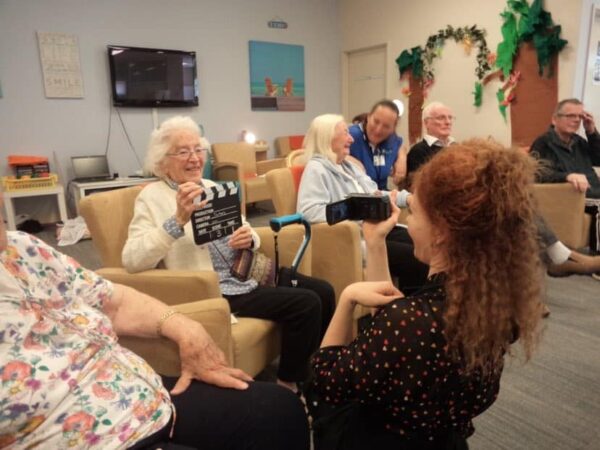
How Drama Therapy Makes a Difference in Aged Care and Disability
Dannielle Jackson is an actor, puppeteer and drama therapist (or dramatherapist) who uses creative therapy skills to support wellbeing and connection in aged care, disability and as a social support. Her passion for creative therapies and success of her therapeutic work was recognised in 2020 with an Australasian Elder Care for Best Dementia Care Program Award. Dannielle spoke to us about her experiences in this niche career and launching the Forever Young program with the Terrapin Puppet Theatre.
Tell us a bit about your story – what led you to dramatherapy and your work in aged care?
I was performing with the Sydney Festival in a show where the premise was about a boy whose mother had died, about processing grief and loss. After the show, a woman and her grandson came up and said “thank you so much for tonight’s performance. My grandson just lost his mother to cancer and he cried through the entire show. I asked if he wanted to leave and he said ‘no, Nan, this story is about me'”. I remember being really moved and inspired. I was a young actor, and this was a big turning point. I had a profound ‘penny-drop’ moment: the arts has so much to offer in terms of health and wellbeing, overcoming traumas; the scope of what arts can do just opened up. 
I started seeking out workshop opportunities and worked as a participatory artist, running NDIS drama workshops and programs at Warrah Specialist School (NSW), then I went on to formally study dramatherapy with IKON Institute. This course hadn’t been offered before or since—to my knowledge there are courses in Australia offering units of dramatherapy, but this was exclusively a dramatherapy course. There were only ten of us, and it was a bit of a pioneer moment because anybody working in the dramatherapy industry at that time had studied abroad, so we were quite unique in that sense.
I started a dramatherapy student placement at Montefiore home, my first time working in an aged care facility. This was the second turning point in my journey, working with a resident who was a holocaust survivor. My experience using dramatherapy in a deliberate way with that one client was life changing.
I could have done my placement anywhere but my motivation and interest in aged care was because my Nan had dementia. I remember being a teenage girl, going to her locked wing and sitting with her after school. I found dementia really interesting, watching people, trying to put the pieces of their life together. I saw them all as such fascinating, rich people; the interest was always there.
Once I was at Montefiore, I just loved it. It’s unusual to say you love being in that environment because it’s clinical: it smells funny, it can be unpredictable, someone’s dementia can be so progressed that they can be challenging. But what I found was people with these amazing life stories and even if they only shared a glimpse, I discovered that drama and different ways of interacting with people could bring out those stories.
Tell us about opportunities you’ve had to use dramatherapy to make a difference to patient or community outcomes
I had a dramatherapy group that was running smoothly at Montefiore, but my first one-on-one client referred to me was a woman who was presenting in difficult ways. She could get verbally angry, wasn’t interacting with staff well, and she didn’t like strangers. I would sit with this lady thinking ‘how am I going to work with her?’ She spoke all these languages and was passionately Jewish; that was an ‘in’. I started bringing lyrics to the song ‘my Yiddishe Momme’ and would ask ‘can you translate this for me?’ And she’d say ‘oh yes, yes …’ and we would spend session after session translating this song. She would teach me little bits of Yiddish. So I would start each session with ‘Ikh habdir lib’ [I love you]—we were in hallways, not in a private room having a session, but I’d sit next to her and say ‘Ikh habdir lib’. And she’d say ‘oh you speak Yiddish?’ That’s how the sessions would start.

We did all this beautiful work. She would teach me how to be a ‘Yiddishe momme’, teaching me what it meant for her to be Jewish. Then I brought in Babushka dolls, using them to talk about family—this is getting into puppetry—she started to use these dolls as her family members, and you can imagine there were some painful stories there. I filmed a bit of it, for the purposes of providing staff with an alternative perspective of how she could interact, to show how, if we talk with clients about themselves, being person-centred and creative in our approach to care, we might get different responses.
This woman had progressive dementia, she wasn’t going to get better, but after working together for six weeks I sat next to her for our last session and said ‘Ikh habdir lib’ and she replied “oh I taught you that!” There was a shift, there was something she recognised. So simple, but what ultimately happened was, she connected. It was a unique placement, it gave me so much wisdom.
There was also dramatherapy group work with the integrated living program, Drama Connections. I was working with three different day community centres for a year, and in that time each of those groups blossomed. There were exercises where the group would hold hands, and they’d still be holding hands an hour later. That’s really the profound nature of what dramatherapy offers: you’re not going to change dementia with dramatherapy but you might create a little more peace and wellbeing, connection, and minimise isolation. With a tragic disease like dementia, they’re important things that health should be striving for.
How did you incorporate puppetry into your dramatherapy work?
The intervention of puppetry is a big thing in dramatherapy, as a therapy option it’s commonly used. Puppetry, masks, those sorts of mediums are part of the toolbelt for a dramatherapist.
Using puppetry in aged care, there’s a really fine line when you’re working with these residents and its always got to be about respect. Dramatherapy is play, and play can be perceived as childish, but I would never want to undermine the integrity of grown adults. I’m always cautious and respectful with these interventions because it could be a game changer. I might have a relationship with someone then introduce an intervention they think is childish and they won’t go there.
Using Babushka dolls is an example of when puppetry was used very intentionally and client-focused. Using the tool of projection through puppets really allowed that client to reflect in a safe and positive way; that’s ultimately why puppets are purposeful and helpful in this environment, because they’re safe, empathic listeners. If we can be cautious about the childish conversation, they create this great portal.
Aged care was acutely impacted during the pandemic. How did this affect your work?
I lost all my contracts over that time, from March 2020. It was an abrupt ‘ok you can’t come anymore’ right at a time where the residents really needed it. It was a really tragic time. We did remote stuff, some Zoom sessions—we made a film with residents living with mild dementia, setting them exercises to find a local shipwreck story to share for a recording. One fellow started sharing how he worked patrol in Sydney Harbour. No one knew this, and he went into great detail, memories coming back to him. This is where role playing in dramatherapy can play a part, sharing small stories, a surprise memory or a memory on rotation. It can offer a new outlook, their stories are valued.
Working remotely only lasted a few months, and it wasn’t as beneficial as it could have been. A lot of residents had gone home to their families, they didn’t necessarily have internet access, or we’d spend half the session trying to navigate technical stuff.
I had an incident where a client was triggered one day and I couldn’t help him, then he logged off. I found that really troubling, so I pulled the pin. It has to be structured, it has to have perimeters and be safeguarded by aged care staff. You can’t just put people in front of a screen.
I didn’t start working again in aged care until I started with Terrapin Puppet Theatre in mid 2021. When I returned to work, I found it challenging. With dramatherapy being so much about connection but having to work with a mask covering my face, I found it impersonal, I found myself working much harder.
Tell us about Forever Young and your work with Terrapin
My theatre experience was as a puppeteer and physical performer as well as an actor, so when I moved to Tasmania I reached out to Terrapin Puppet Theatre. I was looking for artist work, but they wanted to know about my work in aged care. Terrapin asked how I’d feel about collaborating to develop a concept using puppetry and dramatherapy techniques in the aged care sector. That was the seedling for Forever Young. Throughout 2021 we explored how puppets can be used in [the aged care] environment, with the University of Tasmania evaluating us the whole way. We went into numerous residential homes and trialed a number of things, using puppets one-on-one, shadow puppetry in group settings; these are borne out of principles used in aged care homes like robotic cats and pet therapy, but the difference that puppetry offers is human connection, that’s an essential ingredient.
This year we’ve been more focused. We took everything we learned, each piece of feedback, and funneled it into designing a full day program. We go into a home starting with a very theatrical performance, it’s like street theatre: ‘round up! round up!’ This is all about invitation, so we don’t have staff herding residents into a room, like ‘come on, lets go to bingo’. It’s engaging from the first moment, transforming the room, and bringing theatre to them. Then there’s a very personal story about transition, the central character is a future resident of the home.
The second part of the program is focused on one-on-one dramatherapy for residents who are bedbound, with more progressed dementia, disconnected or with behavioural concerns, guiding staff in ways that dramatherapy can inform interactions.
We’ve secured funding to take Forever Young on a Tasmania-wide tour to reach most if not all aged care homes through 2023, and we’re in conversation with potential donors to take it to the mainland in 2024. It’s ambitious but I have full confidence in its promise. The response has been overwhelming and I think it needs to grow. We hope to add a technology component and make programs for remote communities, incorporate multiple versions speaking to the diverse cultures of Australia, including our First Nations Peoples. And we need to work on how puppetry can support everyday functioning of care, so if you’ve got a client in distress or acting in an unhealthy way for themselves and others, we can upskill staff in creative alternatives for behavioural support. We can complement each other in our approach to care. There’s some fantastic research on how, unlike speech and memory, the imagination doesn’t decline in the ageing process, so I’m really pleased the arts in health is getting a bigger a voice and being recognised as a valuable contributor in healthcare. Dramatherapy isn’t black and white, it’s a little bit about intuition. I would argue if you don’t bring sensitivities to this work, you’re not providing a holistic approach to care, not seeing the whole person—I think a diverse cast of practitioners have a part to play in the delivery of care.
For more information about the Forever Young project, visit the Terrapin website





